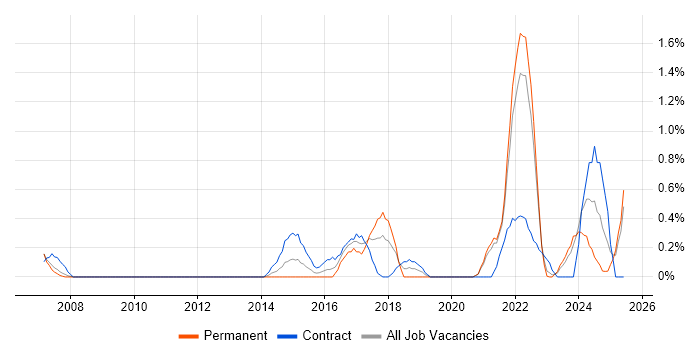Operations Engineer
Merseyside > Liverpool
The median Operations Engineer salary in Liverpool is £65,000 per year, according to job vacancies posted during the 6 months leading to 20 September 2025.
The table below provides salary benchmarking and summary statistics, comparing them to the same period in the previous two years.
|
|
6 months to
20 Sep 2025 |
Same period 2024 |
Same period 2023 |
| Rank |
46 |
55 |
- |
| Rank change year-on-year |
+9 |
- |
- |
| Permanent jobs requiring an Operations Engineer |
2 |
2 |
0 |
| As % of all permanent jobs advertised in Liverpool |
0.50% |
0.30% |
- |
| As % of the Job Titles category |
0.53% |
0.31% |
- |
| Number of salaries quoted |
1 |
2 |
0 |
| 10th Percentile |
- |
- |
- |
| 25th Percentile |
£62,500 |
- |
- |
| Median annual salary (50th Percentile) |
£65,000 |
£27,000 |
- |
| Median % change year-on-year |
+140.74% |
- |
- |
| 75th Percentile |
£67,500 |
- |
- |
| 90th Percentile |
- |
- |
- |
| Merseyside median annual salary |
£65,000 |
£27,000 |
- |
| % change year-on-year |
+140.74% |
- |
- |
For comparison with the information above, the following table provides summary statistics for all permanent IT job vacancies in Liverpool. Most job vacancies include a discernible job title that can be normalized. As such, the figures in the second row provide an indication of the number of permanent jobs in our overall sample.
| Permanent vacancies in Liverpool with a recognized job title |
377 |
647 |
433 |
| % of permanent jobs with a recognized job title |
93.78% |
96.57% |
93.93% |
| Number of salaries quoted |
194 |
446 |
324 |
| 10th Percentile |
£25,750 |
£31,250 |
£29,650 |
| 25th Percentile |
£35,000 |
£39,790 |
£37,500 |
| Median annual salary (50th Percentile) |
£53,500 |
£53,000 |
£49,500 |
| Median % change year-on-year |
+0.94% |
+7.07% |
+3.13% |
| 75th Percentile |
£67,500 |
£68,084 |
£60,200 |
| 90th Percentile |
£75,000 |
£80,249 |
£72,500 |
| Merseyside median annual salary |
£52,500 |
£50,000 |
£49,500 |
| % change year-on-year |
+5.00% |
+1.01% |
+3.94% |


